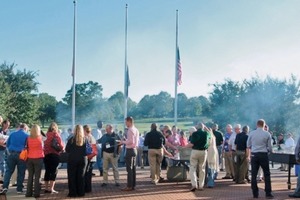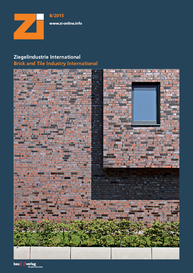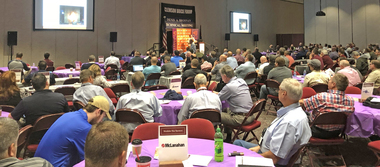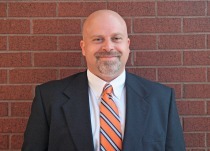Environment, sustainability and product certification in focus
This year‘s Clemson Brick Forum took off on Monday with a block of papers aimed primarily at new brick and tile colleagues with technical knowledge in other sectors. Jim Frederic, Harold Newman and Dave Froberg informed their audience about heavy clay raw materials and their principal characteristics. This year‘s event, including a Southern Cookout on Monday evening as part of the fringe program, attracted more than 400 participants.
The main event centred primarily on the topics environment, sustainability and product certification. The introductory report provided a general rundown on the evolution of currently valid building codes that lean heavily in favour of lightweight construction. The paper disclosed how the rise of lightweight timber-frame construction beginning in the 1970s has affected both the total relevant losses to building insurance companies and state-aid payments in the wake of environmental catastrophes. In the period between 2000 and 2009, disbursements due to severe storms but excluding floods increased by 1700 % over the decade from 1950 to 1959, or by 3500 % for all damage occurrences together, again with the exception of floods. Consequently, certain political circles now appear to be reconsidering the situation. At present, advantageous fire resistance standards are favouring the further spread of lightweight construction, with the result that the brick product market is heading toward a “thin brick“ scenario in which the tonnage sold is declining. Indeed, while brick slips are still yielding adequate margins, the optimization of thin-brick production methods is a frequently discussed topic, both in and of itself and with respect to tightened environmental standards.
Problems encountered in getting new wall systems and wall products certified were dealt with in two lectures. The cost and duration of approval procedures can differ widely from state to state and become very complicated, depending on the respective individual laws and regulations.
Sustainability, lower energy consumption and certification are gradually melding into a single issue in the US. Until now, however, the housing sector has remained exempted from the relevant energy efficiency requirements.
Competition between the various certification systems, LEED – Green Globes – ASHRAE 189.1/IgCCC, appears to be getting keener. An Environmental Product Declaration (EPD) system is under discussion. Proponents say that the US should introduce branch-specific EPDs similar to those already in place in Europe, whereas the British version was the most-quoted example. With the help of pertinent trade associations and institutions, the American Society for Testing and Materials (ASTM) is just now elaborating Product Category Rules (PCR) for the sector.
US brickmakers are also worried about the potential outcome of current debate on new emission guidelines, particularly with regard to certain heavy metals. As reported in an afternoon contribution, less than 1/3 of all affected companies would be able to meet the new requirements with no changes needed. The workplace concentration levels for silica are likewise under discussion, and the tenor is pointing toward a much more restrictive set of rules than those of Europe.
Technical papers came to the fore the next morning. One report recounted the progress made to date in the only new brickyard project currently under way in the United States (Triangle Brick in Texas). Other topics included problems and causes of scumming and how to prevent it, how to optimize kiln operation, the costs and technical drawbacks of using landfill gas as fuel, how to reduce airborne particulate levels by use of atomized air spray nozzles, and diverse aspects of human resource management regarding the integration of junior staff (generation Y).
As always, the event ended with a meeting of the Research Advisory Council of the National Brick Research Center.
Dr. Fritz Mödinger







